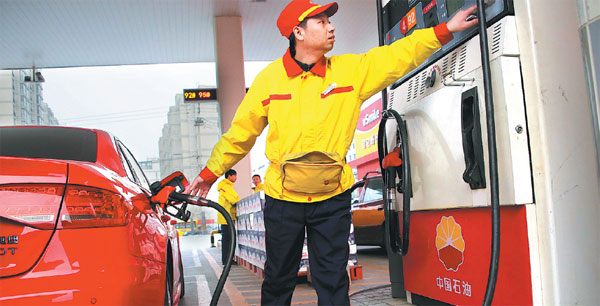PetroChina's expected pipeline spinoff may soften profit blow
(China Daily) Updated: 2017-03-28 06:57With 2016 earnings seen falling 80% to $1b, focus shifts to possible year-end IPO
HONG KONG - As PetroChina Co, China's biggest oil and gas producer, prepares to report what may be its worst-ever earnings, investors are focused on billions of dollars that could be unlocked by a spinoff of its massive pipeline network.
PetroChina's natural gas and crude oil transportation system, stretching from the country's remote borders with Central Asia to major coastal cities, could be worth at least $85 billion, according to analysts at Sanford C. Bernstein & Co and Jefferies Group LLC.
As China prepares to unveil long-awaited energy industry reforms, speculation has grown that the company and its parent, China National Petroleum Corp, may spin off the pipelines into an independent company as soon as this year.
"While the timing is unclear, there is a sense that management is in favor of such a spinoff," said Neil Beveridge, Bernstein's head of Asia-Pacific oil and gas research, who has a buy rating on the stock and estimates the assets are worth 585 billion yuan ($85 billion).
PetroChina's preferred option is an initial public offering that would leave it with a controlling stake, he said.
A Beijing-based spokesman for the company declined to comment.
The future of PetroChina's pipelines has been unclear since 2015.
The industrial authority originally planned to strip the company, as well as its domestic rival China Petroleum & Chemical Corp, known as Sinopec, of the assets to create a new State-owned entity.
That idea has since been scaled back, though regulators are still pushing for greater independence of the pipeline operations and easier access for all users.
Analysts said the spinoff of the country's oil and gas pipeline assets is a good policy but the execution may prove to be an uphill battle.
There is high chance the management is in favor of a spinoff of its massive pipeline network, Li Li, energy research director at ICIS China, a consulting company that provides analysis of China's energy market, said.
Li said the spinoff is considered as part of the wider reform in the oil and gas sector to increase competition and enhance operating transparency and efficiency.
The company may spin off the unit as soon as the end of this year, the Hong Kong Economic Journal reported in February, citing people it didn't identify.
Gordon Kwan, head of Asia-Pacific energy research at Nomura Holdings Inc, sees oil prices needing to rebound to $60 a barrel before any such move. Bernstein's Beveridge sees it delayed until the pipeline segment accounts for less than half PetroChina's revenue, which may not happen until next year.
Monetizing pipeline assets is one of the few options PetroChina still has to raise funds and attract investors under the current low oil price environment, according to Laban Yu, head of Asian oil and gas equities at Jefferies, who sees the pipelines worth 597 billion yuan.
Brent crude, the international benchmark, averaged about $45 a barrel last year, down almost 16 percent from 2015.
PetroChina holds a 71 percent market share of the country's oil and gas pipelines, analysts at Goldman Sachs wrote in a March 7 report. Its network stretches more than 77,600 kilometers, with almost two-thirds of that used for natural gas, according to its latest 20-F filing to the US Securities and Exchange Commission.
The company, which barely broke even in the first half of 2016 although it booked a 24.5 billion yuan one-time gain from selling pipelines, warned in January that it expects full-year profit to fall by as much as 80 percent because of the slump in international oil prices and low domestic natural gas rates.
That means profit may decline to as low as 7.1 billion yuan, down for a third year to the weakest in data going back to 1996.
Bloomberg-China Daily
|
A worker refuels a car at a PetroChina gas station in Beijing. Kim Kyunghoon / Reuters |
- 'Cooperation is complementary'
- Worldwide manhunt nets 50th fugitive
- China-Japan meet seeks cooperation
- Agency ensuring natural gas supply
- Global manhunt sees China catch its 50th fugitive
- Call for 'Red Boat Spirit' a noble goal, official says
- China 'open to world' of foreign talent
- Free trade studies agreed on as Li meets with Canadian PM Trudeau
- Emojis on austerity rules from top anti-graft authority go viral
- Xi: All aboard internet express












